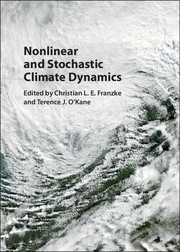Book contents
- Frontmatter
- Contents
- List of Figures
- List of Contributors
- Preface
- 1 Challenges for Ice Age Dynamics: A Dynamical Systems Perspective
- 2 Tipping Points in the Climate System
- 3 Atmospheric Teleconnection Patterns
- 4 Atmospheric Regimes: The Link between Weather and the Large-Scale Circulation
- 5 Low-Frequency Regime Transitions and Predictability of Regimes in a Barotropic Model
- 6 Complex Network Techniques for Climatological Data Analysis
- 7 On Inference and Validation of Causality Relations in Climate Teleconnections
- 8 Stochastic Climate Theory
- 9 Stochastic Subgrid Modelling for Geophysical and Three-Dimensional Turbulence
- 10 Model Error in Data Assimilation
- 11 Long-Term Memory in Climate: Detection, Extreme Events, and Significance of Trends
- 12 Fractional Stochastic Models for Heavy Tailed, and Long-Range Dependent, Fluctuations in Physical Systems
- 13 Modelling Spatial Extremes Using Max-Stable Processes
- 14 Extreme Value Analysis in Dynamical Systems: Two Case Studies
- Index
7 - On Inference and Validation of Causality Relations in Climate Teleconnections
Published online by Cambridge University Press: 26 January 2017
- Frontmatter
- Contents
- List of Figures
- List of Contributors
- Preface
- 1 Challenges for Ice Age Dynamics: A Dynamical Systems Perspective
- 2 Tipping Points in the Climate System
- 3 Atmospheric Teleconnection Patterns
- 4 Atmospheric Regimes: The Link between Weather and the Large-Scale Circulation
- 5 Low-Frequency Regime Transitions and Predictability of Regimes in a Barotropic Model
- 6 Complex Network Techniques for Climatological Data Analysis
- 7 On Inference and Validation of Causality Relations in Climate Teleconnections
- 8 Stochastic Climate Theory
- 9 Stochastic Subgrid Modelling for Geophysical and Three-Dimensional Turbulence
- 10 Model Error in Data Assimilation
- 11 Long-Term Memory in Climate: Detection, Extreme Events, and Significance of Trends
- 12 Fractional Stochastic Models for Heavy Tailed, and Long-Range Dependent, Fluctuations in Physical Systems
- 13 Modelling Spatial Extremes Using Max-Stable Processes
- 14 Extreme Value Analysis in Dynamical Systems: Two Case Studies
- Index
Summary
Abstract
The attribution of factors influencing positive and negative phase durations of climate teleconnections is an important problem in climate research. In addition to inferring such an attribution directly from climate models or from the available data, distinguishing the true causality from simple correlations is often hampered by the multiscale nature of the geophysical system. Here we deploy a data-driven multiscale causality inference methodology to extract the statistically most significant Bayesian causality relations between the discretized historical, seasonal climate teleconnections time series in order to quantify the probabilistic causality impacts from the unresolved/weather scales (i.e. beyond and above the synoptic scales). Our results enable us to quantify the leading role of the annular modes (in particular the Southern Annular Mode) and the tropical Pacific on monthly scale causalities, revealing that the joint causality impacts from these modes lead to a Bayesian predictability that is approximately four times stronger than the joint predictability of the northern hemisphere teleconnections on the same monthly scales. We further show how the obtained causality networks can be validated and elucidate the possible physical mechanisms inducing these relations. This approach enables the prediction of characteristics like phase duration probabilities and provides a better plausible data-driven explanation for the observed higher frequencies of long phases of teleconnections such as the El Niño Southern Oscillation.
Introduction
Understanding the causal relations between the respective teleconnections of the climate system is one of the central problems in ocean/atmosphere/climate science. If we denote the climate variable of interest as y and all other known and measurable variables as x1, …, xn, inference of causality means that in the context of some model (e.g. of the climate model or, alternatively, of some simplified data-driven probabilistic model) we would like to identify all of the xi that have a statistically significant impact on the “explanation”/ prediction of y while distinguishing them from all xj that are “insignificant” (for said y).
- Type
- Chapter
- Information
- Nonlinear and Stochastic Climate Dynamics , pp. 184 - 208Publisher: Cambridge University PressPrint publication year: 2017
- 2
- Cited by



